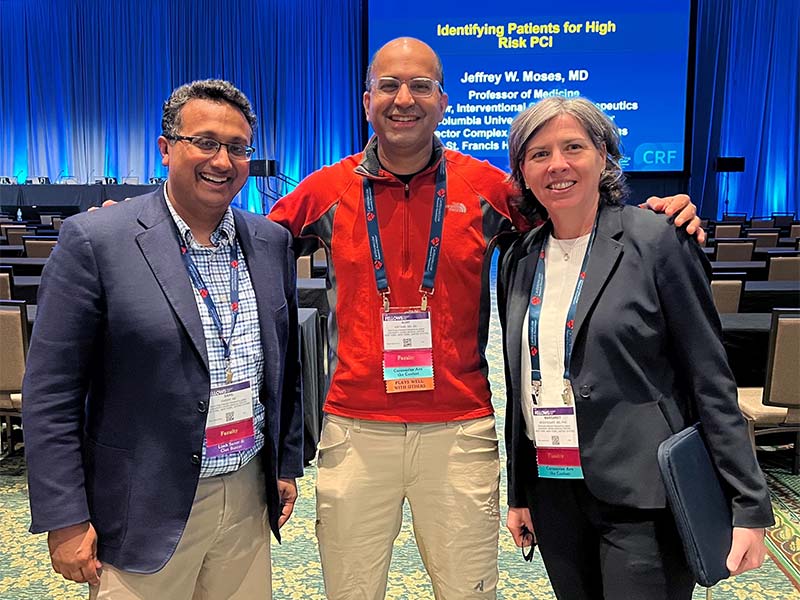For more than three decades, the Cardiovascular Research Foundation (CRF) has hosted an annual Interventional Cardiology Fellows Course led by physicians from NewYork-Presbyterian and Columbia to educate the next generation of interventional cardiologists. The most recent fellows course took place in April 2024, with three NewYork-Presbyterian and Columbia faculty serving as the program directors:
- Ajay Kirtane, MD, Director of the Interventional Cardiovascular Care program
- Margaret McEntegart, MD, PhD, Director of the Complex Percutaneous Coronary Intervention Program and Director of the Cardiac Catheterization Laboratories
- Sahil Parikh, MD, Director of Endovascular Services
The course was created initially to fill educational and training gaps that can occur across institutions. “Interventional cardiology fellowship is almost like an apprenticeship,” says Dr. Kirtane. “You are in a training program, and you learn from the people you’re doing the cases with. There are curricula and requirements, but those can vary depending on where you are training and the case mix to which you are exposed. At the inception of this course, there was no comprehensive course that could cover the breadth of interventional cardiology in a way that is evidence-based and curated with content that everyone in the field should know.”

Drs. Parikh, Kirtane, and McEntegart at the CRF Fellows Course, which provides training and mentoring for early-career interventional cardiologists.
Dr. Kirtane attended the course himself when he was an interventional cardiology fellow and has remained involved with it in the years since. “I remember I was like a sponge because I wanted to soak up anything new and learn more about it,” he says. “What we’ve done over the years is provide a comprehensive program that encompasses not only the technical aspects of how to do procedures, but also knowing when to do them and when not to do them.”
Preparing Fellows for Real-World Practice
The CRF Fellows Course is a survey course that provides in-depth and clinically relevant coronary, structural, and endovascular information for physicians at this stage of their training.
“We have two days of dedicated case review sessions where we present clinical cases and discuss them in a group,” says Dr. Kirtane. “It’s similar to the flipped classroom model that people in other educational areas are familiar with, but hasn’t really been done within the interventional cardiology space.”
“The discussions range from the technical to the cognitive,” says Dr. Kirtane. “For example, in one of the case examples there is a patient with a suspected heart attack who comes in and tells you, ‘I don’t want to have a cardiac catheterization and a stent.’ We discuss what you should do next and how to approach these conversations.”
Career mentoring also plays a big role in the course. “We host career mentoring fireside chats, where about 20 fellows will get together with two or three faculty members and go through what their career path has been and what they do in their personal time – a holistic way of looking at what we do in our careers and personal lives,” says Dr. Kirtane.
Highlights of the 2024 Course
Dr. Kirtane estimates that approximately 200 fellows from around the world attended this year’s event. While the base curriculum stays largely the same each year, updates are made to reflect the latest innovations, technologies, and procedures. The goal is to familiarize fellows with the same tools that interventional cardiologists use in practice. “Even if trainees don’t have access to the latest tools, they at least know they are out there if their patient needs them — or they can collaborate with someone who might be able to bring those tools and techniques to their patients with structural heart disease, valvular heart disease, and endovascular conditions,” says Dr. Kirtane. Updates on new device approvals, including ultrasound renal denervation for hypertension and drug-coated balloon technology for coronary in-stent restenosis, were provided during as part of this year’s course.
A highly popular aspect this year was a pre-course that provided hands-on training for intravascular imaging using case-based tutorials as well hands-on demonstrations, which provided the opportunity for fellows to ask questions in real time. “At NewYork-Presbyterian and Columbia, we use intravascular imaging 90% of the time,” he adds. “But these tools are used much less around the U.S. and even less internationally. There’s more and more data showing that patient outcomes are truly improved by doing intravascular imaging when you’re placing a stent; a pre-course like this seeks to bridge this gap in practice.”
Communication is also a key topic area that is growing in importance. The 2024 opening keynote session from Dr. William Lombardi from the University of Washington Medicine focused on how physician vulnerability can be beneficial in patient care. “His talk tackled head-on the fact that it’s not always easy to take care of some of our sickest patients,” says Dr. Kirtane. “Occasionally there will be patients that, despite our best efforts, have a bad outcome. Being able to reflect and speak empathetically to patients and their families, while also learning and growing from that experience, is so important and not often taught.”
The 2024 event was a prime example of NewYork-Presbyterian and Columbia’s deep dedication to educating the next generation of clinicians. “It’s part of our mission,” says Dr. Kirtane. “We feel strongly that educating trainees is essential for them to get better in their practices. And it helps us improve as educators, because the ability to explain and convey material at a variety of different levels is an important and acquired skill, and critical to effective patient care.”




